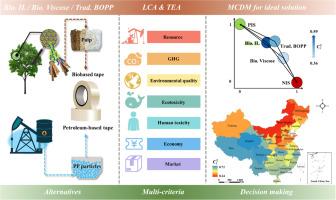Trade-offs in packaging tape performances: Insights from life cycle assessment and multi-criteria decision-making
IF 10.9
1区 环境科学与生态学
Q1 ENGINEERING, ENVIRONMENTAL
引用次数: 0
Abstract
The booming express delivery sector urgently needs alternatives to petroleum-based tape, which hinders the recycling of packaging. Biobased tapes that can be repulped with paper packaging are produced using viscose and ionic liquid (IL) processes. This study evaluates their environmental and economic performance via techno-economic and life cycle assessment. The results show that IL-based tape reduces global warming impacts by 29 % compared to polypropylene (BOPP) tape, but it increases the impacts of toxicity. Viscose-based tape has the shortest economic payback period but results in 15 %–62 % higher environmental impacts than IL-based tape. To reconcile these trade-offs, we developed a multi-criteria decision-making framework to support policymakers and industry stakeholders for their decision-making. The results identify the IL-based tape process as optimal and Qinghai Province as the preferred production location. These findings demonstrate that this advanced biobased tape manufacturing process, adapted to regional conditions, can provide sustainable packaging solutions and circular bioeconomy solutions.

包装胶带性能的权衡:来自生命周期评估和多标准决策的见解
蓬勃发展的快递行业迫切需要石油基胶带的替代品,这阻碍了包装的回收利用。利用粘胶和离子液体(IL)工艺生产可与纸包装复浆的生物基胶带。本研究通过技术经济和生命周期评估来评估它们的环境和经济绩效。结果表明,与聚丙烯(BOPP)胶带相比,il基胶带减少了29%的全球变暖影响,但增加了毒性影响。粘胶基胶带具有最短的经济回报期,但其对环境的影响比il基胶带高15% - 62%。为了协调这些权衡,我们开发了一个多标准决策框架,以支持决策者和行业利益相关者的决策。结果表明,基于il的胶带工艺是最佳的,青海省是首选的生产地点。这些发现表明,这种适应区域条件的先进生物基胶带制造工艺可以提供可持续的包装解决方案和循环生物经济解决方案。
本文章由计算机程序翻译,如有差异,请以英文原文为准。
求助全文
约1分钟内获得全文
求助全文
来源期刊

Resources Conservation and Recycling
环境科学-工程:环境
CiteScore
22.90
自引率
6.10%
发文量
625
审稿时长
23 days
期刊介绍:
The journal Resources, Conservation & Recycling welcomes contributions from research, which consider sustainable management and conservation of resources. The journal prioritizes understanding the transformation processes crucial for transitioning toward more sustainable production and consumption systems. It highlights technological, economic, institutional, and policy aspects related to specific resource management practices such as conservation, recycling, and resource substitution, as well as broader strategies like improving resource productivity and restructuring production and consumption patterns.
Contributions may address regional, national, or international scales and can range from individual resources or technologies to entire sectors or systems. Authors are encouraged to explore scientific and methodological issues alongside practical, environmental, and economic implications. However, manuscripts focusing solely on laboratory experiments without discussing their broader implications will not be considered for publication in the journal.
 求助内容:
求助内容: 应助结果提醒方式:
应助结果提醒方式:


